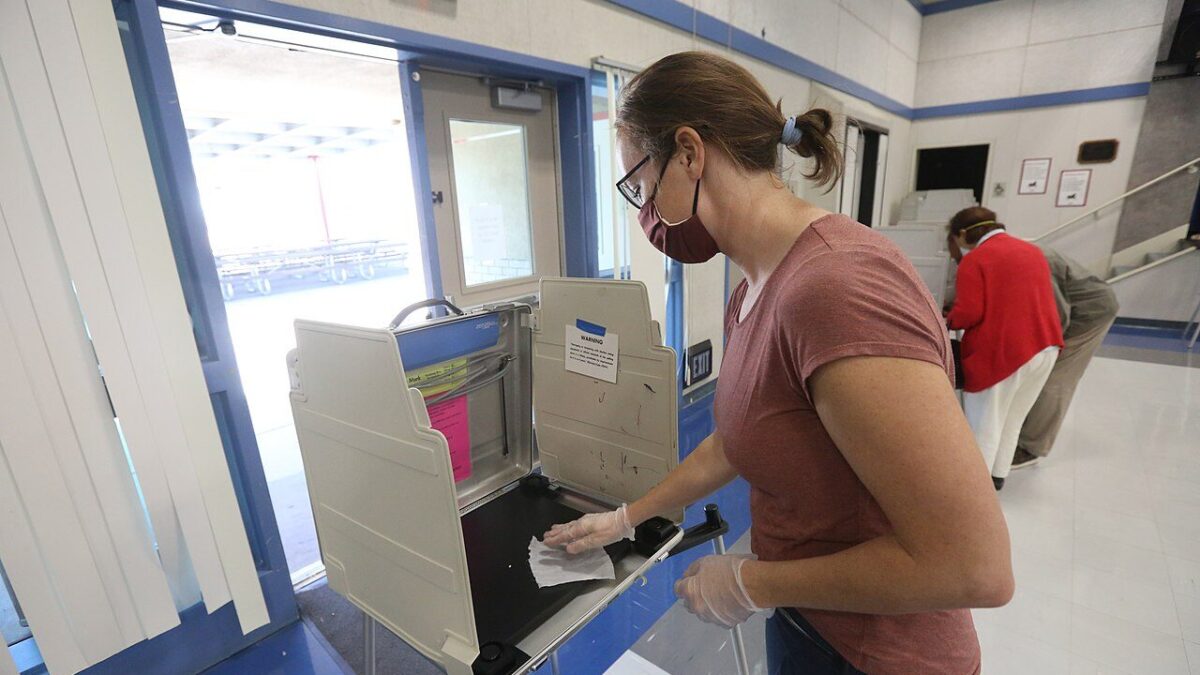Either the FBI or the Los Angeles District Attorney’s office flubbed a major investigation into the election poll workers data company Konnech, whose CEO Eugene Yu was arrested on Tuesday, or a deeper probe remains ongoing, details from a bond hearing held earlier today in a Michigan court suggest.
In a press release on Tuesday, L.A. County District Attorney George Gascon announced that Yu had been taken into custody on “suspicion of theft of personal identifying information” by the Meridian Township Police Department, near Yu’s home in central Michigan. The L.A. County’s D.A. Office, which is seeking Yu’s extradition to Los Angeles, explained in its announcement of Yu’s arrest that the CEO’s business, Konnech, “distributes and sells its proprietary PollChief software” that is used to manage election workers’ confidential information.
“Under its $2.9 million, five-year contract with the county, Konnech was supposed to securely maintain the data and that only United States citizens and permanent residents have access to it,” the press release noted. But “District Attorney investigators found that in contradiction to the contract, information was stored on servers in the People’s Republic of China.”
Earlier this morning, however, Yu’s attorney, Mark Kriger, told Michigan’s 55th District Court Judge Donald Allen, Jr., that the charge is false, adding that he had an affidavit signed by Konnech’s Director of IT attesting that “there was no data stored in a Chinese server.” Yu’s lawyer further explained that his client had been meeting voluntarily with the FBI over the past month and that during one of those meetings, the Director of IT told the FBI that no data was stored on a Chinese server, but rather that “everything has been in the U.S., either in Lansing, East Lansing, or backed-up on the Microsoft Cloud.” Kriger then stressed that since the Director of IT made those representations to the FBI, it “would be a crime if false.” Further, according to Yu’s lawyer, the FBI was not conducting a criminal investigation into Konnech, but rather the bureau was pursuing an investigation of a data breach outside the company.
It is difficult to reconcile Kriger’s claims with D.A. Gascon’s assertion in his press release from earlier this week that his investigators found “information was stored on servers in the People’s Republic of China.” What that evidence is, however, remains unclear, with Yu’s attorney telling the court he had not yet seen the state court indictment, but understood it alleged a claim for “embezzlement” related to the election data contract. Kriger then doubled down on the Director of IT’s statement that data was not stored in China, raising the question of whether the L.A. D.A. has targeted an innocent man.
Kriger’s representations about the FBI’s involvement also prove baffling, as the Detroit criminal attorney told Judge Allen that the FBI had indicated there was no federal criminal investigation into Konnech related to the data breach. Rather, Yu’s attorney presented the FBI’s involvement as related to a data breach that Konnech blamed on True the Vote, whom he framed as a “far-right organization” involved in the “Stop the Steal” movement. According to Yu’s attorney, True the Vote “hacked” Konnech’s system and then released private information about poll workers, leading Konnech to sue True the Vote civilly.
But L.A.’s leftist D.A. is unlikely to find evidence coming from True the Vote credible, and in any event, his press release spoke of the D.A. investigators uncovering the evidence. So, did the FBI accept Yu’s statements at face value and focus on investigating the True the Vote organization, ignoring potentially incriminating evidence about Konnech’s servers? Or did the FBI investigate and confirm Konnech’s representations? If so, the L.A. D.A.’s office will have some explaining to do.
Another possible option remains, however: The FBI discovered the alleged China server and coordinated with the L.A. D.A.’s office to obtain an arrest of Yu while a federal investigation continues.
At this stage it is impossible to know the extent of evidence the L.A. County prosecutor has in support of his allegation that Konnech used a server in China or the veracity of those allegations. It is also impossible to know yet whether the FBI played a part in the recent arrest of Yu or had blindingly accepted the word of Konnech’s Director of IT.
For now, though, having succeeded on his motion, Yu will be released after posting $100,000 cash and a $1,000,000 bond, pending his extradition to California. Ingham County prosecutor Nicole Matusko agreed to the release, with multiple requirements, such as that Yu surrender his passport and be required to wear a tether, after confirming that when arrested on Tuesday, Yu had not been attempting to flee the state; rather, he was heading to the airport to travel to Houston for a hearing on in his civil case against True the Vote. True the Vote, for its part, sees Yu’s arrest as vindication of its claims of a China connection. But it will be much longer before the country will know the truth.









